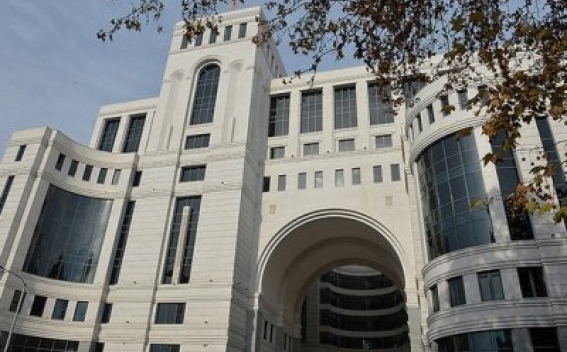Answer of the Department of Media and Public Diplomacy of the Foreign Ministry of Armenia to the question of “Armenpress” news agency
Question: In an interview to the AzTV state television, the President of Azerbaijan Ilham Aliyev once again voiced territorial claims towards the Republic of Armenia. How would you comment on those statements?
Answer: The President of Azerbaijan made a number of comments in his interview and we will address some of them, which clearly demonstrate the approaches of the Azerbaijani leadership to make the use of force a tool of regional policy.
First, in the above-mentioned interview the President of Azerbaijan in fact acknowledges that the Azerbaijani armed units have infiltrated the territory of the Republic of Armenia, while justifying this action with a claim that “Zangezur is the land of our ancestors”. This is nothing but a gross violation of international law, as none of the international norms and principles accepts the attempt to occupy the territory of the neighbouring country, under such a historical, and in this case distorted “pretext.”
Read also
It is noteworthy that along with these provocative actions, the President of Azerbaijan circulates the so called “Zangezur corridor” formulation which stands in full contradiction with the trilateral joint statements of November 9, 2020, and January 11, 2021, particularly the provision on unblocking the existing economic and regional links. While realizing that these claims, which violate the international law, are baseless, the Azerbaijani side tries to bring forward the argument of its readiness to use force to this end.
Second, the President of Azerbaijan clearly indicates that the war unleashed against Artsakh was aimed at wiping out Nagorno-Karabakh from the map of the region and depriving the people of Artsakh of their homeland. Nagorno-Karabakh, as a territorial entity, is recognised in a number of international documents and Azerbaijan has either joined or expressed its consent to the majority of them. Reconsideration of its international commitments by Azerbaijan and the use of force will not lead to the disappearance of Nagorno-Karabakh from the international arena.
This approach obviously pursues the goal of violating the human rights of the people of Artsakh, including the right to self-determination and territorial integrity of Artsakh.
Third, Azerbaijan claims that in the post-war period it was able to impose its agenda on the international community. We do not deny that Azerbaijan has made such attempts and continues to do so, and these attempts are based on the approach of removing the Nagorno-Karabakh conflict from the international agenda through the violation of Armenia’s territorial integrity. The fact that the international community – the OSCE Minsk Group Co-Chairmanship, the Co-Chair countries and many other international actors clearly states that the Nagorno-Karabakh conflict is not resolved yet, best demonstrates that these attempts of Baku have failed.
Fourth, Azerbaijan pursues the policy of deepening but not overcoming the humanitarian consequences of the war, which is particularly expressed through non-complying with its commitments to exchange prisoners of war, hostages and detained civilians, while persecuting them under trumped-up charges and consistently fueling Armenophobia.
Fifth, the use of force, the threat of use of force can not create lasting peace – it threatens all the countries and peoples of the region.
Armenia will consistently defend the right of the Armenians of Artsakh to self-determination on the territory of Artsakh and the territorial integrity of the Republic of Armenia, on the basis of international law.

























































